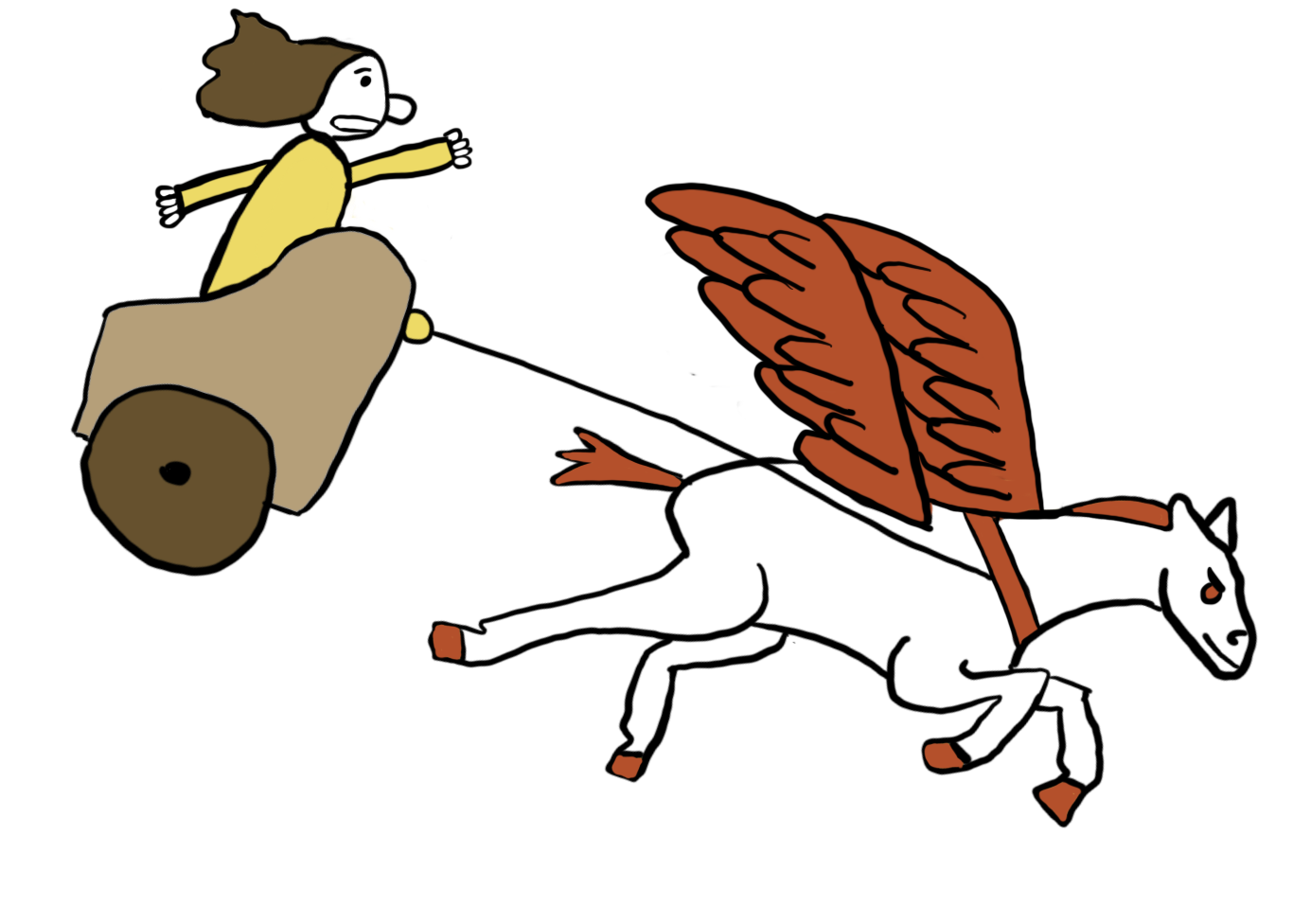Steering Pegasus
How to wield the reins of ambition
Everyone has the potential to do great things, and I’d venture half of us have the ambition to realize that potential. But few can manage the pull of ambition.
Imagine ambition as a Pegasus, the flying horse from Greek mythology. We’ve attached a chariot to this mighty beast, set it on a path, and now it’s pulling us across the sky. We have an idea on the distant horizon—a fitness goal, a creative project, a portrait of a happy family. It’s thrilling to hold the reins of our Pegasus, but how do we steer it?
Handling Vice
As humans, we crave comfort and pleasure—valid pursuits we ought to enjoy. But we can struggle to balance the impulses that create them. Aristotle’s Nicomachean Ethics labels these temptations as vices—things that do not lead us toward our goals. We know the classic vices of smoking, alcohol, gambling, sugar, or shiny objects. I don’t believe these are inherently “bad” pursuits, and some could argue that everyone has a vice. I’ve rejected this idea for years—an act of puritanical self-righteousness—but have come to accept it. Even without a classic vice, plenty of activities exist to relax or relieve stress. While I don’t smoke or gamble, I enjoy beer, coffee, incessant gum-chewing, TV, and the occasional doom scroll on Twitter.
It’s no news that indulging our vices can drive us to depravity. If the Pegasus yanks us downward, we will crash into the earth. To offset vice, we need virtue.
Handling Virtue
We can define virtue as something that moves us toward an objective or ideal. For instance, “hard work” can help us achieve more in our careers. A virtue of health can enable us to live longer, achieve athletic endeavors, or play basketball with our grandkids.
At face value, virtues may seem objectively good, but we can have too much of a good thing. If virtues go unchecked, they can lead us astray. When the overambitious Pegasus ascends too high, we burn up in the atmosphere and experience burnout.
Sufficient sleep, regular exercise, and eating well are great habits in service of health. But if our adherence to health turns into an obsession—where we’re unable to dine with our family and friends, miss events due to a rigid exercise schedule, or overspend on groceries and expensive supplements—we will drift from our vision of an ideal life.
Balance through Volatility
Without virtue, there’s no wind to lift the wings of our ambition. Without vice, we’ll burn ourselves out or ascend to a level of self-righteousness that makes us detestable to loved ones. Striking balance between virtue and vice requires us to acknowledge the good and evil—or, more accurately, the higher-minded ideals and animal desires—within us. We must believe that living with intentionality around our values is desirable while simultaneously accepting vices as vital to the human experience.
To strike this balance, some adopt the “work hard, play hard” mentality. In other words: An excess of virtue followed by an excess of vice. People may log sixteen-hour workdays and binge drink on weekends to unwind. While some circles may praise this hardcore industriousness, it’s ironically less productive in the long term.
“Work hard, play hard” is highly volatile, as the sharp altitude changes along the vice and virtue axis expend energy to reverse one’s state. One is constantly climbing or descending vertically instead of progressing horizontally with moderation.
A Middle Path
Most worthwhile endeavors require sustained effort, so it’s beneficial to bias sustainability over intensity. Sometimes we climb higher and drift lower to relax, but the overall trajectory should average a steady pace.
Finding the middle path of moderation requires clarity around which activities are vices and virtues, and we can misconstrue a vice of deficiency or excess for a virtue.
Consider fear. If viewed as a vice, we might value bravery as a virtue. But if we become reckless, we may throw all caution to the wind—turning our virtue into a vice of excess. Conversely, we could value conscientiousness as a virtue. Yet, we could become too cautious—avoid confronting people for fear of retaliation or social discomfort—and turn that value into a vice of deficiency: cowardice. The middle ground—courage—is challenging to tread, for we must acknowledge and experience fear but act despite it.
Once we decide on our virtues, we can manage our vices. One approach is to dilute our existing vices. For instance, if we want to limit alcohol intake, we could scratch the itch for a relaxing drink with a mocktail instead of a cocktail. Instead of zoning out and binge-watching TV, we could zone out on a long walk to decompress after work.
We need both vices and virtues to make progress on our goals. Rather than avoid vices entirely, we can pick ones that don’t unravel us. We cannot escape them, but we can learn to enjoy the journey of steering Pegasus.
Junk Drawer
See Our World in Data for recent global health, capital, and population statistics.
Read Sean’s weekly recaps of the two-hour All-In podcast, covering various economic and social topics.
Use these stock doodles for your next presentation.








Moderation gets you farther. We all need our vices to avoid burnout. Thank you Justin!
This is excellent! I really can relate and totally agree with you blog. Thank you for sharing. ❤️👍